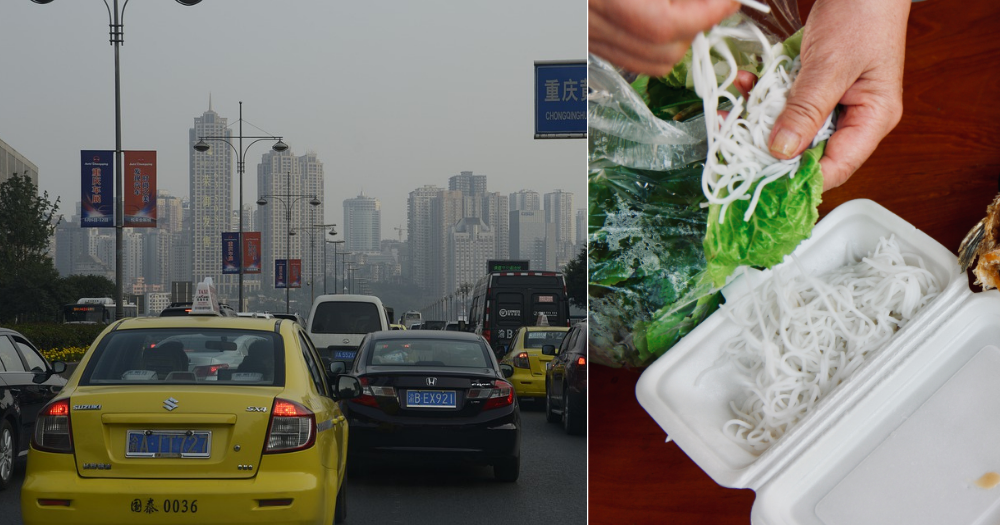Air pollution has been identified as a factor when it comes to why people choose to order food delivery.
A study by researchers at the National University of Singapore (NUS) found that poor outdoor air quality led to a higher amount of food delivery consumption and plastic waste.
The study focused on China, as it is home to one of the world's largest groups of online food delivery consumers, with 350 million registered users across the country.
An estimated number of 65 million meal containers are discarded every single day in China, with office workers contributing to over 50 per cent of the demand, according to a press release from NUS.
The study was conducted in three cities affected by smog in China: Beijing, Shenyang and Shijiazhuang.
It was published in the academic journal Nature Human Behaviour.
Poor air quality increases demand for food delivery
Using a survey of of 251 office workers' lunch choices over 11 workdays, as well as data on 3.5 million food delivery orders from about 350,000 users, a strong link between air pollution and food delivery consumption was drawn.
The study found that a 100 μg/m³ increase in PM2.5 levels led to the rate of food delivery consumption increasing by 7.2 per cent.
The PM2.5 measurement indicates the density of fine particles (i.e. particles less than 2.5 micrometers in diameter) in the air.
Among office workers, the same shift in PM2.5 levels lead to an increase in food delivery consumption by 43 per cent.
Associate Professor Chu Junhong from the Department of Marketing at NUS Business School, an author of the study, explained that the percentage was higher for office workers as they could typically avoid exposure "only by ordering food to be delivered to his or her doorstep".
There were fewer alternatives to food delivery if workers wanted to avoid outdoor pollution, as compared to other consumers who might be able to access a home kitchen, for example.
This was especially the case for workers without a canteen in their office building.
Controlling air pollution to reduce plastic waste
The study also looked at photos of 3,000 meals submitted by office workers to quantify the number of disposable plastic items that were used in both food delivery meals and dine-in meals at restaurants.
Based on the photographs, the researchers found that those who had meals via food delivery used an average of 54g of plastic, as compared to a dine-in meal, which used an average of 6.6g of plastic.
This worked out to an estimated increase of 10g of plastic on average with a 100 μg/m³ PM2.5 increase in pollution.
The researchers also estimated that on a given day, if all of China were exposed to a 100 μg/m³ PM2.5 increase in pollution (a phenomenon "routinely observed" in Beijing), 2.5 million more meals would be delivered, requiring an additional 2.5 million plastic bags and 2.5 million plastic containers.
This meant that air pollution control measures could also help to reduce plastic waste.
Understanding human behaviour
The study aimed to understand the human behaviour that leads to plastic pollution, as there was a gap in research in this area, explained Alberto Salvo, also an author of the study, and an Associate Professor from the Department of Economics at the NUS Faculty of Arts and Social Sciences.
"While we see more research on the impact plastic pollution is having on the natural environment, there has been less work trying to understand the human behaviour that drives plastic pollution," he said.
"This is where our study seeks to contribute – finding a strong causal link between air pollution and plastic waste through the demand for food delivery," he added.
NUS said that the researchers will continue to look into situations where "pollution begets pollution" — where humans defend themselves from environmental pollution by using more natural resources, and end up polluting more.
They also noted that public concern over exposure to Covid-19 has led to booming demand for home-delivered meals which are predominantly packaged in plastic.
The researchers hope that their work will "add to the voices calling for more environmentally friendly packaging and improved waste management".
Totally unrelated but follow and listen to our podcast here
Top images via alexeva8/Pixabay and Matt Briney/Unsplash
If you like what you read, follow us on Facebook, Instagram, Twitter and Telegram to get the latest updates.
